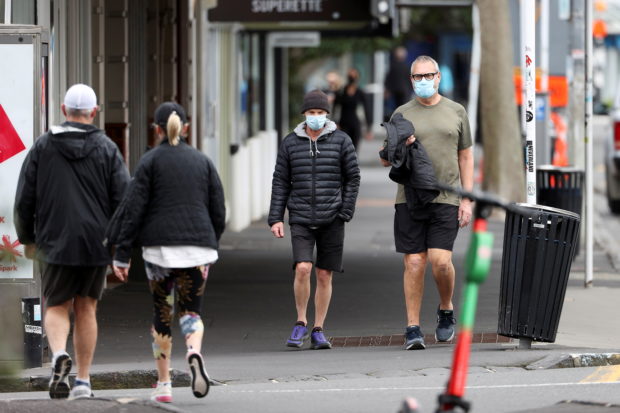
People wear masks as they exercise during a lockdown to curb the spread of a coronavirus disease (COVID-19) outbreak, in Auckland, New Zealand, August 26, 2021. REUTERS FILE PHOTO
WELLINGTON — New Zealand may not get back to having zero coronavirus cases in the community, the director general of health said on Thursday, as the country continues efforts to stamp out the infectious Delta variant of the virus.
New Zealand eliminated COVID-19 last year and had been largely virus-free, barring a small number of cases in February, until the latest outbreak of the Delta variant erupted in August, prompting Prime Minister Jacinda Ardern to order a nationwide lockdown.
Its biggest city Auckland is still in lockdown with a small number of new cases being reported everyday.
“We may not get back to zero but the important thing is we are going to keep finding any infections and basically continue to contact trace, test and isolate people so that we stop the virus circulating in the community… that’s the aim,” Ashley Bloomfield, the director general of health told Radio New Zealand.
Bloomfield said the aim now was to try and get on top of the outbreak while also ramping up vaccination rates.
“Get that vaccination rate up over 90%…that’s absolutely our new means whereby we will be able to get back to the freedoms we had,” he said.
Ardern’s tough lockdowns and international border closure in March 2020 helped rein in COVID-19, but the government now faces questions over a delayed vaccine rollout. After an apparent delayed start, New Zealand has ramped up inoculation with nearly 40% of the country’s 5.1 million people now fully vaccinated.
Authorities reported 23 new cases of COVID-19 on Wednesday, all in Auckland, taking the total number of cases in the current outbreak to 1,080.
At a daily COVID-19 press conference later in the day, however, the COVID-19 Response Minister Chris Hipkins said the government had not given up on achieving zero cases.
“We are not giving up on getting back down to zero. That is absolutely what we are striving for,” Hipkins said.